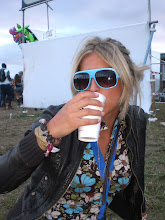'Whiteness' - My Interesting & Inspirational Key Concept
This short section sets out to explain the concept I found most interesting from the Race & Ethnicity module of Term Two.
December 18th 2008 saw us take a seen exam paper for MSVC205. One question that I answered was regarding the concept of 'whiteness' and how it takes us the position of 'ordinariness' (Dyer, 2007).
Sometimes, I believe, this ethnic category is overlooked as the norm, as it is never usually categorised as something like Afro-Caribbean or Asian. I enjoyed lectures that attempted to make us think in a different way, and analyse this concept as an ethnic category within itself.
Race boundaries seem to be blurred in modern times, as there are now a lot more options regarding how race is seen. For example, recent arguments in society include residents of Cornwall wanting their own 'category', however this has yet to be agreed to. In the Western world, 'whites' have always been seen as white, middle-class, heterosexual males/females, which seems to be rather a hegemonic view on the category. It is suggested that anyone not fitting into these labels should be seen as 'The Other', meaning anything that is not associated with the Western race or Western hegemonic is out of the ordinary according to racial ideologies.
The area that I found interesting and inspirational, was that it is apparent that even though maybe subconsciously, the 'white race' can also become hybrid. For example, the Indian diaspora of dress and make-up and food has seemed to permeate British culture, which makes more of a mixture within the races. If this worked on a conscious level, I believe, and people realised that these diasporic groups work well together to form a huge culture, there would be much less racism and hegemonic values would be overturned. This binary opposition can be very problematic (Strauss, 1979), as the discourse can create much trouble. White is always seen as dominant against 'black' races, much like masculine is over feminine and cultured is over savage.
All in all, people of the modern world still need a discourse to compare ourselves to. Pluralism seems to be an ideal, where everyone would get their own say regarding culture and the world would have a huge multi-cultural view. However, we in Britain still live through a hegemonic existence and due to the acts of the media and other ethnic groups, this does not look like it is going to change anytime soon.
Subscribe to:
Post Comments (Atom)


No comments:
Post a Comment